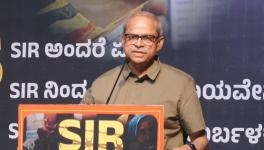What does the New Election Commissioner Bill Introduced in Rajya Sabha Today Propose?

Image for representational use only.
Altering the procedure for appointment of members of the Election Commission of India laid down by the Supreme Court earlier this year, the Bill replaces the Chief Justice of India with a cabinet minister of the Prime Minister’s choosing. Additionally, only those persons who have held a post equivalent to a secretary to the government can be appointed as the ECI members, as per the Bill.
—
A Bill regulating the appointment and other conditions of service of the Chief Election Commissioner and other election commissioners is scheduled to be introduced in Rajya Sabha today.
On March 2, 2023, the Supreme Court of India, in Anoop Baranwal versus Union of India (2023), had directed the constitution of a committee related to the regulation of appointments in the Election Commission of India (ECI).
As per the judgment, the committee should consist of the Chief Justice of India, the Prime Minister and Leader of the Opposition in Lok Sabha for appointment of the ECI members.
The Supreme Court had clarified that its directions on the procedure for selection shall hold till the time the Parliament makes a specific law on the appointment of the ECI members.
In an article on the judgment, The Leaflet had aired the possibility of the Union government introducing a legislation in the Parliament laying down an altered procedure giving the executive a greater leeway than it has received within the procedure established by the Supreme Court.
It is an assumption that with the introduction of the Chief Election Commissioner and other Election Commissioners (Appointment, Conditions of Service and Term of Office) Bill, 2023, the Union government aims to do just that.
In effect, the Bill gives the executive significant leeway to appoint members of the ECI, restoring the position before the Supreme Court’s ruling in Anoop Baranwal.
The Bill proposes a “selection committee” which does not include the Chief Justice of India (CJI) for the appointment of members of the ECI.
Besides the Prime Minister and Leader of the Opposition in Lok Sabha, the committee will comprise a Union cabinet member of the Prime Minister’s choosing.
In effect, the Bill gives the executive significant leeway to appoint members of the ECI, restoring the position before the Supreme Court’s ruling in Anoop Baranwal.
If passed by the Parliament, the Bill will replace The Election Commission (Conditions of Service of Election Commissioners and Transaction of Business) Act, 1991.
How will ECI members be appointed?
The Bill proposes the constitution of a “search committee” to prepare a panel of five persons for consideration by the “selection committee” for appointment as members of the ECI..
The “search committee” will be headed by the cabinet secretary and comprise of two other members not below the rank of secretary to the government of India “having knowledge and experience in matters relating to elections”.
The “selection committee” will be chaired by the Prime Minister and will have Leader of the Opposition in Lok Sabha and a Union cabinet minister “to be nominated by the Prime Minister” as members.
The “selection committee” may choose from the proposed names or it may consider any person other than that included in the list prepared by the “search committee”.
It has been clarified in the Bill that where Leader of the Opposition in Lok Sabha has not been “recognised”, the leader of the single largest party in opposition shall be deemed to be the Leader of Opposition.
Lok Sabha does not “recognise” a Leader of the Opposition if no Opposition party has at least 10 percent of the seats in the House. There has been no Leader of the Opposition in Lok Sabha since 2014 as no party has been able to meet the quorum.
In its ruling, the Supreme Court had not specified whether any member of the “selection committee” will have the authority of being a chairperson.
Who can be appointed as an ECI member?
The Bill proposes that members of the ECI be appointed from amongst persons who are holding or have held a post equivalent to the rank of secretary to the government of India.
In its ruling, the Supreme Court had not specified whether any member of the “selection committee” will have the authority of being a chairperson.
According to the Bill, the members “shall be persons of integrity, who have knowledge of and experience in management and conduct of elections”.
Article 324 (Superintendence, direction and control of elections to be vested in an Election Commission) of the Constitution does not prescribe any requirements as to qualification.
Article 324(2) only stipulates that the appointment of the Chief Election Commissioner and election commissioners shall be made by the President “subject to the provisions of any law made in that behalf by Parliament”.
The Parliament enacted the Election Commission (Conditions Of Service Of Election Commissioners And Transaction Of Business) Act in 1991.
The Act deals with the salary, terms of office, pension and other perks for election commissioners, but does not prescribe a selection procedure for their appointment or an eligibility criteria.
In November 2022, during the course of the proceedings in Anoop Baranwal, the Bench had inquired into the procedure followed by the Union government in the appointment of members of the ECI.
The Attorney General of India R. Venkataramani had then placed a note stating that “as per convention”, a list of serving and retired officers of the rank of secretary and chief secretary to the Union government is prepared by the Union Ministry of Law and Justice.
The list is based on the database maintained by the Department of Personnel And Training (DoPT).
A panel of names from this list is first sent to the Prime Minister for approval and then the President for official appointment.
“The process adopted is highly confidential,” the note says.
The Union government had defended the practice of only appointing bureaucrats as members of the ECI .
The government stated that they are suited for the job since they gather the experience of overseeing elections early in their careers as district magistrates.
Term of the ECI members
The Bill does not change the term of office specified in the 1991 Act.
All ECI members shall hold office for a term of six years from the date of assuming office or till they attain the age of 65 years, whichever is earlier.
However, there is a key change in the manner that the proposed provision in the Bill is worded.
In the 1991 Act, the provision on vacation of office upon attaining 65 years of age was specified as a proviso to the main provision.
On re-appointment of a person as an ECI member, the Bill specifies that “the Chief Election Commissioner and other election commissioners shall not be eligible for re-appointment.”
Now, the condition of age has been made part of the main provision.
Notably, in Anoop Baranwal, the Supreme Court had stated that the provision is being “observed in its breach” by the Union government.
According to the Bench, the government is taking recourse to the exception laid down in the provision, through its recommendation to appoint only those persons who are either retired from public office or are on the verge of retirement and, therefore, would not be able to have six year terms.
The Bench had also added that, “A proviso cannot arrogate itself to the status of the main provision. The exception cannot become the Rule. Yet, this is what the appointments have been reduced to. It undermines the independence of the Election Commission.”
On re-appointment of a person as an ECI member, the Bill specifies that “the Chief Election Commissioner and other election commissioners shall not be eligible for re-appointment.”
To clarify, the proposed provision does not prohibit the promotion to the post of Chief Election Commissioner of a person who has previously served as an election commissioner.
This holds significance since the Union government, for the past few years, has been following a convention of appointing only those persons as the Chief Election Commissioner who have previously been appointed as election commissioners.
Experts say this practice effectively allows the executive the power to test out the pliability of an election commissioner before disclosing the decision on their promotion.
Another departure from the 1991 Act is the Bill’s prescription that: “Where an election commissioner is appointed as Chief Election Commissioner, his term of office shall not be more than six years in aggregate as the election commissioner and the Chief Election Commissioner.”
During the proceedings in Anoop Baranwal, former Justice K.M. Joseph had circulated printouts sourced from Wikipedia listing the length of term served by each Chief Election Commissioner.
The Bench had accordingly noted, “There has been a disturbing trend after 2004 of picking people who they know will not be able to complete six years of tenure… The so-called independence that you pay lip service to is completely destroyed by having this kind of term.”
In that case, the Union government had responded by stating that instead of only considering their term as the Chief Election Commissioner, the whole term of a person as a member of the ECI must be taken into account.
If the terms as election commissioner and Chief Election Commissioner were taken together, it would show that most Chief Election Commissioners have had a tenure in the range of four to six years, the government had claimed.
During the proceedings in Anoop Baranwal, former Justice K.M. Joseph had circulated printouts sourced from Wikipedia listing the length of term served by each Chief Election Commissioner.
In its judgment, the Supreme Court had rejected the above line of reasoning.
The court had clarified that the Constitution of India enshrines a term of six years separately for the Chief Election Commissioner and the election commissioners.
Accordingly, a person may serve two consecutive terms of six years each, the court had added.
How can an ECI member be removed from office?
The Bill does not propose any change to the manner of removal of an ECI member.
An ECI member can only be removed in accordance with Article 324(5), the Bill states.
As per Article 324(5), the Chief Election Commissioner enjoys the same security against removal as a judge of the Supreme Court [that is, they can only be removed through the impeachment process mentioned under Article 124(4)].
The Article also mentions that the conditions of service of the Chief Election Commissioner cannot be varied to their disadvantage after their appointment.
Other election commissioners do not enjoy such security. They can be removed from office on the recommendation of the Chief Election Commissioner to the President, as laid down under Article 324(5) of the Constitution.
However, the recommendation for removal “must be based on intelligible and cogent considerations which would have relation to the efficient functioning of the election commission,” the Supreme Court held in T.N. Seshan versus Union of India (1995).
This unequal security of tenure was first affirmed by the Supreme Court in S.S. Dhanoa versus Union of India (1991).
In his separate but concurring judgment in Anoop Baranwal, former Justice Ajay Rastogi had recommended that the procedure for removal of all members of the ECI be equalised.
“It is the need of the hour and advisable, in my view, to extend the protection available to the Chief Election Commissioner under the first proviso to Article 324(5) to other election commissioners as well until any law is being framed by the Parliament,” Justice Rastogi had observed.
Justice Rastogi had noted further that even as the 1991 Act (or later amendments to it) equalised the other conditions of service— such as those on salary, tenure and perks— equal protection against removal had not been granted.
Click here to read the Bill.
The author is a Staff Writer with The Leaflet, who likes to read magazines and watch documentaries (after work). Ask him for recommendations at tushar.kohli@theleaflet.in
Get the latest reports & analysis with people's perspective on Protests, movements & deep analytical videos, discussions of the current affairs in your Telegram app. Subscribe to NewsClick's Telegram channel & get Real-Time updates on stories, as they get published on our website.
























